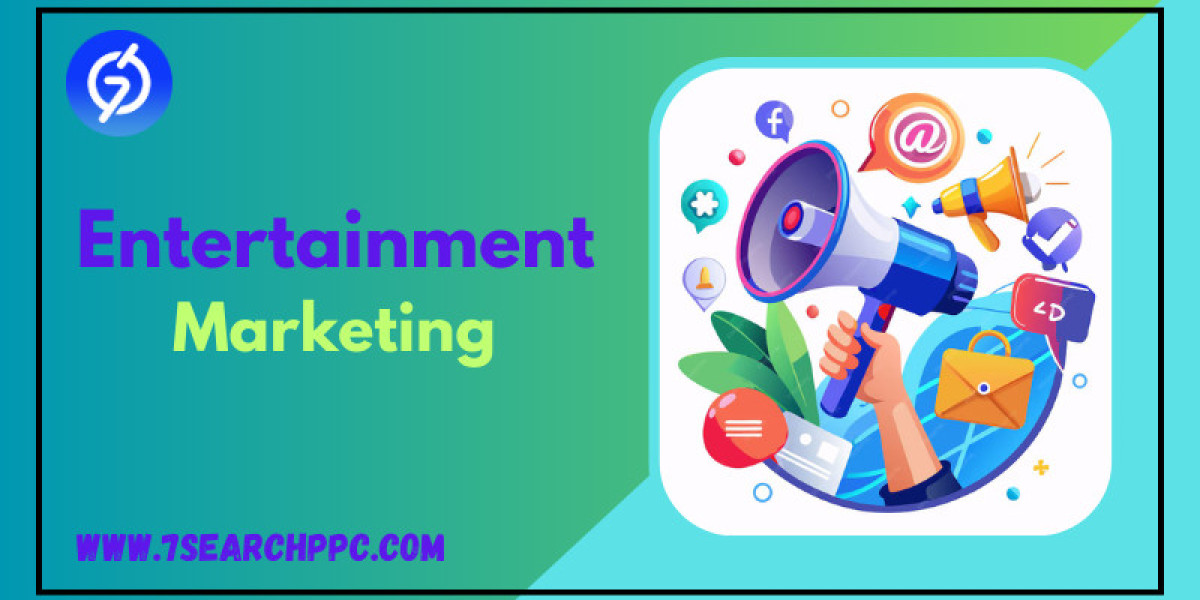In the fast-paced world of digital advertising, entertainment marketing has emerged as a dominant strategy for businesses seeking to captivate their audiences. From blockbuster films and TV series to video games and music, the entertainment industry has a massive reach. Leveraging this influence through strategic marketing campaigns allows brands to connect with consumers on an emotional and cultural level. Whether you're a global corporation or a local brand, understanding entertainment marketing can help you stay competitive.
Entertainment marketing isn't limited to celebrities or red-carpet events. It encompasses a broad range of strategies that promote brands through entertainment platforms like streaming services, social media, video content, and interactive experiences. By unlocking the power of entertainment marketing, businesses can enhance visibility, drive engagement, and boost customer loyalty.

What Is Entertainment Marketing?
Entertainment marketing refers to the use of entertainment platforms, influencers, and content to promote brands, products, or services. It taps into the emotional power of entertainment to connect with audiences in a memorable and authentic way. Rather than interrupting consumers with traditional ads, entertainment marketing integrates brand messaging into content that consumers already enjoy.
This form of marketing can take various shapes, such as product placements in movies, celebrity endorsements, branded entertainment content, and partnerships with entertainment platforms like Netflix or YouTube. The goal is to create seamless, engaging experiences that resonate with audiences, making the brand a part of the entertainment narrative.
Benefits of Entertainment Marketing for Your Business
Entertainment marketing offers several key advantages for businesses:
Increased Brand Awareness: By associating your brand with popular entertainment content, you can reach a broader audience and gain more visibility.
Enhanced Engagement: Entertainment marketing is more interactive and immersive than traditional forms of advertising, helping to capture attention and drive deeper engagement.
Emotional Connection: When audiences feel entertained, they are more likely to develop an emotional connection with your brand, resulting in higher brand loyalty.
Targeted Reach: Entertainment marketing allows you to target specific demographics based on the type of content they consume, leading to more effective campaigns.
Increased Credibility: Partnering with reputable entertainment brands, influencers, or platforms can boost your brand's credibility.
Best Strategies to Know for Entertainment Marketing
To truly unlock the power of entertainment marketing, businesses need to adopt innovative and effective strategies. Below are some key approaches to consider:
Leveraging Media Ads for Maximum Impact
Media ads play a critical role in entertainment marketing. Whether on television, streaming platforms, or social media, media ads can be used to engage audiences at key moments during entertainment content. Media ads allow brands to communicate their message in a visually compelling format, whether through traditional commercials or more interactive and personalized ads.
Types of Media Ads in Entertainment Marketing
- Video Ads: Popular on platforms like YouTube, Hulu, and TikTok, video ads capture user attention with dynamic visuals and storytelling.
- Banner Ads: These ads appear on websites or streaming platforms and serve as a more subtle way to reach viewers without interrupting their experience.
- Programmatic Ads: These are automated, data-driven ads that target specific user demographics based on their viewing habits and preferences.
- Interactive Ads: These allow audiences to engage directly with the content by clicking, swiping, or even participating in the ad itself.
To achieve the best results, businesses should aim to align their media ads with the entertainment content they appear alongside. Ads placed during highly anticipated shows, popular movies, or trending music videos will attract a larger audience and generate more engagement.
Harnessing the Power of Home Entertainment Advertising
Home entertainment advertising involves reaching consumers through platforms that deliver entertainment directly to their homes, such as streaming services, smart TVs, and gaming consoles Entertainment Advertising Agencies. As the shift from traditional cable TV to on-demand streaming accelerates, home entertainment advertising has become a prime opportunity for brands.

How to Integrate Home Entertainment Advertising
Streaming Platforms: Brands can place ads on popular streaming platforms like Netflix, Hulu, or Disney+ that are highly targeted to specific viewer interests.
In-Game Advertising: With the rise of online gaming, in-game ads offer an immersive way to engage with consumers. Brands can place ads in virtual environments, create branded in-game experiences, or collaborate with game developers.
Smart TV Ads: Smart TVs offer new ad formats that are interactive and targeted. These ads take advantage of data about viewing habits to deliver personalized content.
Branded Content: Creating content that blends entertainment with advertising can be a powerful approach. Think branded documentaries, web series, or collaborations with content creators.
Home entertainment advertising allows businesses to reach consumers in a relaxed environment where they are more likely to engage with the content and connect with the brand.
The Role of Entertainment Advertising Agencies
For businesses looking to break into the entertainment industry, working with an entertainment advertising agency can make all the difference. These agencies specialize in crafting marketing strategies that blend seamlessly into entertainment platforms and target the right audiences.
Key Services Offered by Entertainment Advertising Agencies
Creative Development: Entertainment advertising agencies help brands develop engaging content that fits within the entertainment landscape, from product placements to branded videos.
Strategic Partnerships: Agencies can connect businesses with the right entertainment partners, such as influencers, production studios, or content creators.
Data-Driven Targeting: With access to audience data and advanced analytics, agencies can target specific demographics based on their entertainment consumption habits.
Integrated Campaigns: Agencies ensure that entertainment marketing efforts are integrated across multiple platforms, from television to social media, maximizing impact and reach.
Brand Endorsements: Entertainment agencies can facilitate celebrity or influencer endorsements, providing additional credibility and visibility for brands.
Partnering with an entertainment advertising agency ensures that your marketing efforts are handled by experts who understand how to navigate the complex world of entertainment.
Exploring the Potential of Ad Networks
Ad networks are an essential part of any entertainment marketing strategy. These networks serve as intermediaries between advertisers and publishers, helping businesses display their ads on relevant entertainment platforms. Whether it's a website, mobile app, or streaming service, ad networks can help brands reach a specific audience more efficiently.
Benefits of Using Ad Networks in Entertainment Marketing
Targeted Advertising: Ad networks use algorithms and audience data to ensure your ads are placed in front of the right viewers based on their entertainment preferences.
Cost Efficiency: Instead of managing multiple ad placements, ad networks streamline the process by automatically placing your ads on multiple platforms.
Performance Tracking: Ad networks offer comprehensive analytics and tracking features, allowing businesses to monitor the success of their campaigns in real-time and make adjustments as needed.
Cross-Platform Reach: With ad networks, brands can expand their reach across various platforms, from mobile games to streaming apps, increasing exposure and engagement.
Combining Content and Commerce for Maximum Engagement
Entertainment Advertising Agencies a powerful trend in entertainment marketing is the fusion of content and commerce, where brands create or sponsor content that directly drives sales. This can take the form of shoppable videos, live-streamed events, or influencer partnerships where products are integrated into the entertainment experience.
How to Implement Content-Driven Commerce
Shoppable Videos: Video content that allows viewers to click on products featured in the content, taking them directly to purchase pages.
Live Shopping Events: Streaming live shopping experiences that combine entertainment and product demos, often hosted by influencers or celebrities.
Branded Experiences: Creating immersive branded content, like virtual reality experiences or interactive stories, that integrate products naturally into the entertainment.
Influencer Collaborations: Partnering with influencers in the entertainment space to create content that promotes your brand in an authentic and relatable way.
By blending entertainment with shopping, businesses can drive immediate action from their audiences while maintaining an engaging and enjoyable user experience.
Conclusion
Entertainment marketing has evolved into a dynamic and essential tool for businesses looking to connect with modern audiences. Whether through media ads, home entertainment advertising, entertainment advertising agencies, or ad networks, brands have an array of strategies to choose from. By staying attuned to the latest trends and platforms in entertainment, businesses can create campaigns that not only entertain but also engage and convert.
As the world of entertainment continues to grow and diversify, now is the time to unlock its power for your business. By leveraging the best strategies and tools, you can elevate your marketing efforts and stay ahead of the competition.
FAQs
What is entertainment marketing, and how can it benefit my business?
Ans. Entertainment marketing involves promoting your brand through entertainment channels such as movies, TV shows, music, social media, and influencers. It helps businesses reach a wider audience by integrating products or services into entertainment content, building stronger connections with consumers, and enhancing brand visibility.
What are the best strategies for successful entertainment marketing?
Ans. Some key strategies include collaborating with influencers, creating branded content that aligns with popular entertainment trends, using experiential marketing to engage consumers, leveraging social media campaigns, and incorporating product placements in films or TV shows to build organic brand recognition.
How do I measure the success of my entertainment marketing campaigns?
Ans. You can measure success by tracking metrics such as brand awareness, audience engagement, social media interactions, and conversion rates. Additionally, monitoring key performance indicators (KPIs) like reach, impressions, and return on investment (ROI) helps evaluate the campaign's overall impact on your business.








